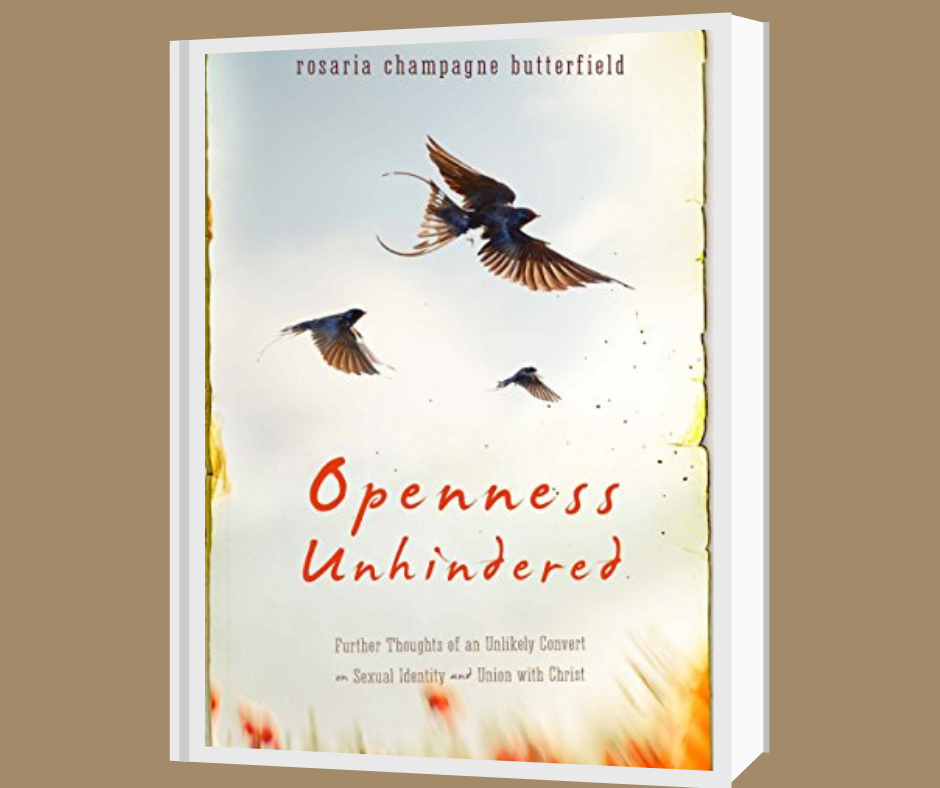Book Reviews
Openness Unhindered: Further Thoughts of an Unlikely Convert on Sexual Identity and Union with Christ, by Rosaria Champagne Butterfield | Review by Rosa Byler

Increasing gender confusion around us suggests that a higher percentage of new Christians will suffer ongoing temptation and discouragement over pre-conversion life patterns. Most churches, not just those who have been somewhat isolated from the culture around us, lack understanding or experience in dealing with the fallout of homosexuality. Rosaria Butterfield, an educator and former leader for both the feminist and homosexual causes, has not only an insider’s acquaintance with homosexuality but a Christian scholar’s familiarity with the Scripture. Openness Unhindered is her attempt to form a “bridge to Christ” between the church and Christians discouraged with any sort of sin, particularly sexual.
The book’s outline follows three central themes of the Christian experience: conversion, identity, and community. Butterfield starts with the story of her own conversion: she began reading the Bible as she would any other book for a research project, “examining its textual authority, authorship, canonicity, and internal hermeneutics.” Her training in cross-referencing helped her to see the whole Bible as an “open highway to a holy God,” and her friendships with Christian people demonstrated the gospel in ordinary life. After coming to faith, she started reading the Bible “in big chunks…from Genesis to Revelation many times in one year,” searching in particular for the shape of her new identity in union with Christ. (16-17)
Lessening acquaintance with the Bible has contributed to our society’s developing perception of sexual orientation as identity; Butterfield addresses this at length from the perspective of both Scripture and experience. She makes it clear that sexual sin is not “worse” than other sins, although it can have more lasting whole-person effects. Nor does conversion automatically remove past temptations or establish a heterosexual orientation, and churches place a heavy burden on strugglers when they assume that it will—or should, with enough faith.
In an excellent chapter on repentance, Butterfield addresses the question of residual sin and shame. Glamorizing failure and magnifying grace is a common error; the more biblical position she outlines is that “…sin continues in the life of a new creature [and] must be dealt with in a posture of Christian combat.” Repentance, not more grace, is the antidote to failure. It is “…a sign of God’s hand upon us…a conversion proof, as only a saved person can repent of sin.” (63-64) Butterfield frequently references the writings of the Puritans, who seem to have done well with their understanding of sin and repentance.
The greater part of the book concerns the study of identity in Christ, followed by several chapters on community, “the ground zero of our life in Christ”: how our faith is “visible and serviceable, powerful and potent.” (147) Christian community is a natural outworking of Christian identity and is demonstrated by sharing life with the goal of knowing and being known. Butterfield and her husband base their practice of hospitality more on the model of her former LGBT lifestyle than on the custom of many Christians. One night a week is for neighborhood guests; church friends are hosted on Sundays; other drop-ins share food, conversation, and Scripture readings and songs throughout the week.
Inadequately defined terminology can quickly become emotionally charged, and a former English professor is just the one to bring clarity to the buzzwords surrounding this discussion. Butterfield, although a self-confessed Pharisee and word-lover, is charitable to those who disagree with her. Her objection to terms such as “gay Christian” is well-formulated; yet in the chapter on conflict, an actual conversation demonstrates the biblical way to disagree on minor matters. A worthwhile takeaway: “Friendship and neighborly proximity are necessary components of working through theological differences in Christian love.” (146)
This book is excellent for anyone who has been “clobbered” (author’s term) with sexual sin, but it is also a theological primer on the Christian life. In an environment of declining biblical literacy, Butterfield’s Bible knowledge and study skills are a challenge. I marveled at the contrast between her pre-conversion use of training, experiences, and gifts and the way she now uses those same assets to glorify God in new life patterns. Her transformation from helping to shape the feminist movement to being a strong and articulate voice for biblical values is truly “unlikely” and a testimony to the power of God.